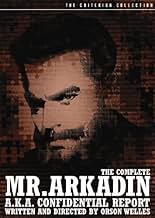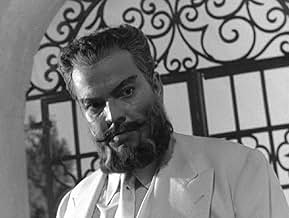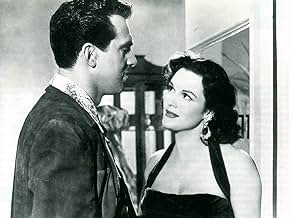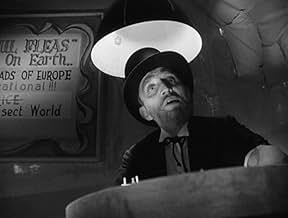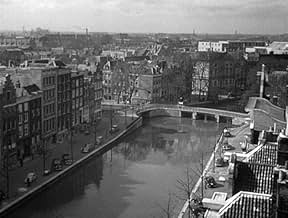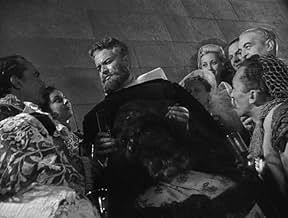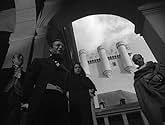An elusive billionaire hires an American smuggler to investigate his past, leading to a dizzying descent into a cold-war European landscape.An elusive billionaire hires an American smuggler to investigate his past, leading to a dizzying descent into a cold-war European landscape.An elusive billionaire hires an American smuggler to investigate his past, leading to a dizzying descent into a cold-war European landscape.
- Awards
- 1 nomination total
- Oscar
- (as O'Brady)
- Woman in Apartment
- (as Tamara Shane)
- Secretary
- (as Terence Langdon)
- Parisian Woman with Bread
- (as Annabel)
- First Munich Policeman
- (as Gert Frobe)
- Second Munich Policeman
- (as Eduard Linker)
Featured reviews
This movie is a mess, but it's a fascinating mess. The movie was taken out of Welles' hands in the editing phase and was released in various cuts all over the world over the course of a decade or more. The version I watched was assembled from all of the various versions, and supposedly most closely resembles what Welles wanted. It's still a slightly confusing jumble, but it's entertaining. It's unlike most movies of the mid 50's, with rapid edits, odd camera angles, and the aforementioned narrative structure utilizing flashbacks.
The sound is either mostly or all post-dub, which also adds to the disorienting effect. This movie has a lot of flaws (several shots are out of focus, Welles' fake nose looks terrible), but I found it an intriguing mystery, and I was never quite certain what was coming, which is exceedingly rare these days. Plus, the many brief appearances of classic character actors, such as AkimTamiroff, Katina Paxinou, Mischa Auer, and Michael Redgrave, all playing bizarre and eccentric characters, is amusing.
The fact that Arkadin connects closely to Kane or Quinlan is obvious and certainly interesting. Although it should seem obvious at this late date that Welles has patterns and themes that reoccur throughout his films. Does this fact still illuminate anything? If anybody questions the fact that Welles is an artist...well, this film will just add to their confusion. But for us believers this film can function like the ritual suffering of the penitents in the film. It hurts so good!
Welles is a childhood hero. There's nothing rational about my feelings about Welles. If there are Welles fan boys, I admit to being one. But I have entertained the notion that I like Mr. Arkadin (also called Confidential Report, sometimes) as much as I do because it so completely betrays Welles as a titanic artist having to deal with the small frustrations and vicissitudes of Everyman. The bones of the thing, the behind the scene life of the film, the fact that the whole thing at one point passed through the man's hands shows through more than on any film he ever made. You actually see the customs stamps at the end of reels! His stratagems are more obvious, his resources more threadbare here than even Othello, his most legendary prolonged/disjointed/truncated shoot. Parts of it look shot on Super8; as good as some of it looks, at other times, the lighting doesn't feel professional (I am thinking of the nightclub and penitent procession scenes). In the end, I think Arkadin is the one completed and released Welles film that humanizes the man, without exactly bringing him low.
Clinching my interest in the film is Welles' comment, reiterated for different interviewers through the years, that Arkadin contained the best story he ever thought up to film. (He made a radio script of it first, and when he refined it for film, he saw fit to keep perhaps 95% intact from the radio play.) I may not agree with Welles' own appraisal of Arkadin as a story, but again, his comments betray perhaps more than intended: Welles' deep, and possibly irrational, feeling of attachment to this film. He said he considered it the most 'destroyed' film (destroyed by outside interference) he ever made. --Worse even than The Ambersons! I really think he never had "closure" with the experience of making Arkadin, and it continued to haunt him the rest of his days.
I invite you to take a look at it (it is available in many cheap public domain DVD versions) and see if you, too, fall under its spell. If it leaves you totally cold, or you can't take it seriously, I understand. But remember, better and worse DVD versions exist. Supposedly, the Criterion Collection will release it sometime in the next couple of years. That may be the version to make your definitive move with.
That's partly because their performances are just that bad, and partly because there is so much else in this movie that works well, or at least strives for excellence. There are a variety of striking images placed before us. Welles' eye for distinctive camera angles and atmospheric lighting was working overtime in this picture. You might quibble with some of his choices as being a tad too melodramatic, but you can't fault him for careful attention to detail. His performance is the usual Welles stuff--overpowering, and perhaps at times almost cartoonish like that of Arden and Medina. But make no mistake: when Welles was cartoonish, it was because he meant to be. Not because that was the only way he knew how to "act." Paolo Mori was also wonderful as as Arkadin's daughter. There were other great characters along the way. Their performances also clash noisily with the wooden hamming from Arden.
And, as others have mentioned, the sound is problematic. Clearly, the movie was overdubbed, and badly, after the fact. In fact, when I first started watching it, I was convinced that it was originally filmed in a foreign language. Nope--something went wrong during filming, it appears, or Welles for reasons of his own decided to re-do all of the sound in the studio after filming. The result is pretty bad. Whether a scene is in a small room, a piazza, an open field, or a vaulted cathedral, the result is the same. Background noise sounds just like that: artificial background noise. The voices sound like they were recorded in a very small, very dead studio. Amateurish and clumsy.
The result is a movie that is, at times, interesting to watch, but it's hard to forget its weaknesses, even for a moment.
One wonders how many times the stagehands had to wrangle a raging Welles off of Arden, prying his hands from the actor's neck, convincing him that murder is illegal, even for a cinematic giant, feeding him rum punch and peanuts, and telling Arden to go hide for fifteen minutes until the anger has passed.
For those interested in investigating further, The Criterion Collection have done a wonderful 3 disc edition which collates all the available edits (including two Spanish versions which are known, hilariously, by the unexplained mis-crediting of the lead actor!?) and working them into a 'final' version hinted at by Welles' notes and conversations with the ubiquitous Peter Bogdanovich (who also features in the documentary, unsurprisingly). This 'final' version, while far from perfect, restores the original flashback structure as well as the original beginning and ending sequences. On the first disc, however, is the 'Corinth' version (originally discovered by Bogdanovich) that already incorporates some of the author's original intentions. This particular edit also features a highly illuminating commentary track by Welles scholars Jonathan Rosenbaum and James Naremore who consider this version to be the most satisfying. Also included are three mp3's of the aforementioned Harry Lime radio plays that had a direct influence on the story, featurettes by Welles biographer and actor Simon Callow, and a highly welcome reprint of the Mr. Arkadin novel (or novelisation? - you decide) with an excellent newly commissioned introduction by Robert Polito. All in all, this set is a must for the Welles aficionado and should be of interest to anyone with a true appreciation of cinema.
Did you know
- TriviaUntil recently, the version in possession of Corinth Films was generally regarded closest to Orson Welles' cut. In April of 2006, the Criterion Collection released a comprehensive three-DVD set of this movie, featuring three versions: the "Corinth" version, "Confidential Report" (the European cut), and the newly edited "Comprehensive" version. Each version contains a few shots or lines that are missing from the other two. Because this movie was taken out of Welles' control in post-production, it will never be known exactly what he had in mind for the complex flashback structure of which he spoke later in his life. "The Comprehensive Version", which airs on Turner Classic Movies, runs one hour 47 minutes.
- GoofsOrson Welles' prosthetic nose disappears when Arkadin meets with Jakob Zouk.
- Quotes
Gregory Arkadin: And now I'm going to tell you about a scorpion. This scorpion wanted to cross a river, so he asked the frog to carry him. No, said the frog, no thank you. If I let you on my back you may sting me and the sting of the scorpion is death. Now, where, asked the scorpion, is the logic in that? For scorpions always try to be logical. If I sting you, you will die. I will drown. So, the frog was convinced and allowed the scorpion on his back. But, just in the middle of the river, he felt a terrible pain and realized that, after all, the scorpion had stung him. Logic! Cried the dying frog as he started under, bearing the scorpion down with him. There is no logic in this! I know, said the scorpion, but I can't help it - it's my character. Let's drink to character.
- ConnectionsEdited into Histoire(s) du cinéma: Fatale beauté (1994)
- SoundtracksSaeta
Performed by Antoñita Moreno.
- How long is Confidential Report?Powered by Alexa
Details
Box office
- Gross worldwide
- $4,528
- Runtime
- 1h 33m(93 min)
- Color
- Aspect ratio
- 1.37 : 1

